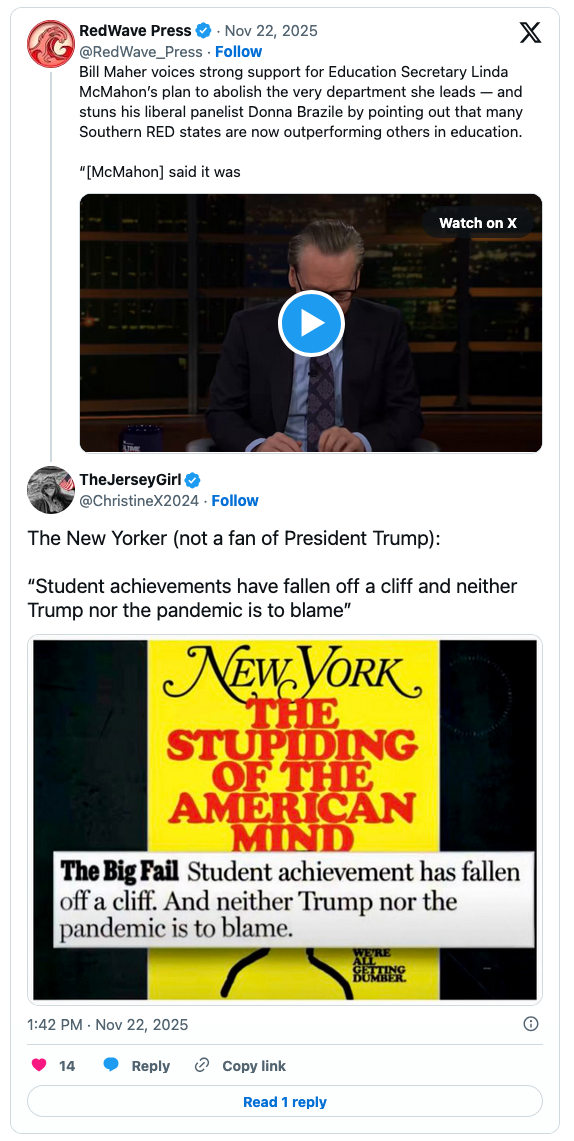
Here’s a question: How much replication do we need in government?
How many levels of government must we have doing the same thing — and sometimes conflicting with each other?
How many captains should there be on a ship?
This could come to mind when pondering, oh, let’s say, the United States Department of Education (DoE). Efforts to eliminate it are met with resistance, but how many realize that it’s just one out of about 1,200?
That’s right. Considering federal, state, county, city, and town education departments, there are approximately 1,150-1,200 coast to coast. Given this, if we nixed a quarter of them, let alone one, would they really be missed? Well, quite a number of Americans certainly wouldn’t miss the DoE, and one of them is comedian and commentator Bill Maher.
In fact, on his show Friday evening, Maher defended President Donald Trump’s plan to eliminate the DoE. Bemoaning the state of today’s education, the commentator asked an obvious question.
“Why do we need the Department of Education,” wondered Maher, “if it has done such a s[*****] job?”
(Clearly, Maher needs to read my Saturday article on vulgarity and get educated in that department.)
The other possibility is that perhaps we don’t have enough education departments. Maybe the 1,201st will be the ticket.
Get Yer Edumecation, Son
Maher made his comments while defending not just Trump, but also the latter’s education secretary, Linda McMahon. He pointed out that conservative southern states such as Mississippi and Louisiana are now surpassing some liberal states in reading and math. And this isn’t happening, mind you, because of woke DoE prescriptions, but because these states have returned to basics. (More on that later.)
Addressing political analyst Donna Brazile and rapper “Killer Mike” (ahem), the commentator related on his show, Real Time with Bill Maher, that McMahon said of the DoE that
it’s mostly a pass through for funds that are best managed by the states. This stuff does not sound too unreasonable to me. … It would not mean ending, ending federal support for education, funding for low income students, students with disabilities. That predates the education department. And that would continue as would protecting students’ civil rights.
The video linked below includes the entirety of Maher’s comments.

Mississippi, the Intellectual State?
Note that Brazile, the “political analyst,” was ignorant of Mississippi’s impressive recent educational gains. But they are real. The Gateway Pundit reported on this in September, informing that Mississippi has gone “back to basics and teaching things like phonics.” The site continued:
It’s amazing. If you focus on teaching kids to read rather than telling them about social justice and gender theory, they actually learn to read.
Gateway then quotes commentator Kelsey Piper, who, providing details, wrote at Substack that Mississippi’s
fourth grade students outperform California’s on average, even though [California] is richer, more educated, and spends about 50% more per pupil.
The difference is most pronounced if you look at the most disadvantaged students. In California, only 28% of Black fourth graders read at or above basic level, for instance, compared to 52% in Mississippi. But it’s not just that Mississippi has raised the floor. It has also raised the ceiling: The state is also one of the nation’s best performers when you look at students who are not “economically disadvantaged.”…
[And] it’s not just Mississippi — Louisiana, Alabama, and Tennessee have adopted the same strategies, stemmed the bleeding affecting states elsewhere, and seen significant improvements….
This is especially impressive considering that the Magnolia State is still our country’s poorest. It also has, proportionately, the largest black population (36.4 percent of the state). This is significant because black children generally lag behind other groups in academic performance. Yet Mississippi has still registered its recent gains.
Are We Educated Enough to Turn Back the Clock?
As for the larger problem though, Maher complained that kids today “don’t know anything.” This isn’t just “OK, Boomer” curmudgeon-like griping, either. Numerous studies show that our time’s youths are learning less than they did decades ago, despite access to greater information. The kicker:
As even UNESCO admits, “Most kids not learning are in school.” (Emphasis added.)
So what’s the real solution to our educational woes? Well, it’s implicit in something philosopher G.K. Chesterton wrote in 1910. “Men invent new ideals because they dare not attempt old ideals,” he observed. “They look forward with enthusiasm, because they are afraid to look back.”
Obviously, overt “wokeness” doesn’t belong in education. Yet we also don’t even need new pedagogies or novel educational paradigms. Oh, there is a reason they’re disgorged with regularity. Apple doesn’t make money unless it releases a new iPhone and gives you a reason to replace your old one. Likewise, entities such as the Pacific Educational Group make, collectively, billions of dollars selling curricula to school systems. And no new educational concepts means no more money collected. Consequently, as Chesterton also wrote, in “a school to-day the baby has to submit to a system that is younger than himself.”
Contrary to myth, schools also don’t need more “technology.” What, for example, does the internet facilitate? It enables you to access most of all the information in existence. But children can’t absorb most of all the information in existence. They only need cherry-picked relevant information, and books serve this end just fine. As to this, don’t you think there’s a reason tech moguls often send their kids to low-tech schools?
What Kids Really Need
Were we not afraid to “attempt old ideals” (eternal ones, actually), we’d accept that we need to dial back education to well before the DoE’s 1979 creation. We’d resolve to return to teaching phonics, the three R’s, and fact-based history (and stop calling it “social studies”). But then there’s something even more important. Question:
How can a person learn from you if he’s not first willing to listen to you?
Regarding this, how can students learn much if the following environment (video below) prevails in government schools?
Such lack of order is common today, too.
This is why discipline, obedience, and respect, three dirty words today, are prerequisites for learning. Again: A person cannot learn from you unless he’s first willing to listen to you. In our age of permissiveness, however — among parents, teachers and, really, virtually everyone — schools are often zoo-like babysitting centers.
So, yes, eliminating one of our 1,200 education departments is a good start. But without moral renewal and the shedding of the snowflake mentality, we’ll continue to breed idiocrats.





